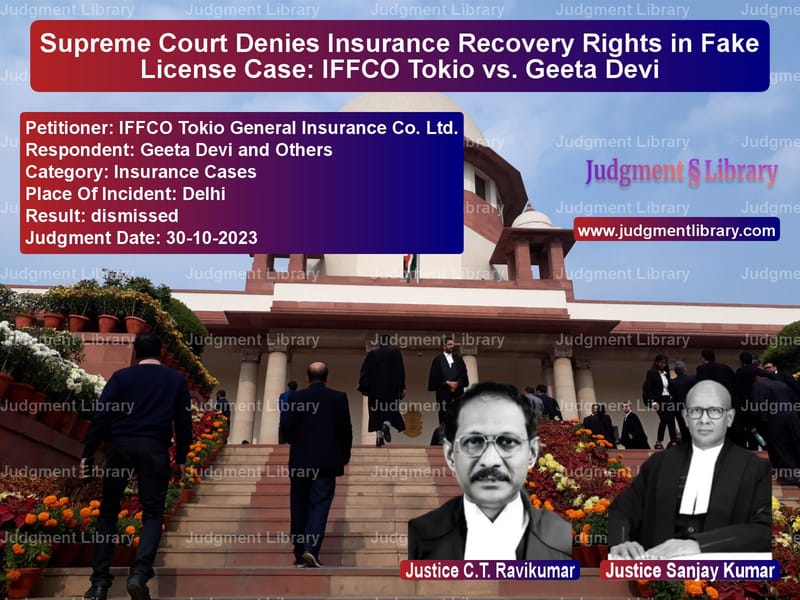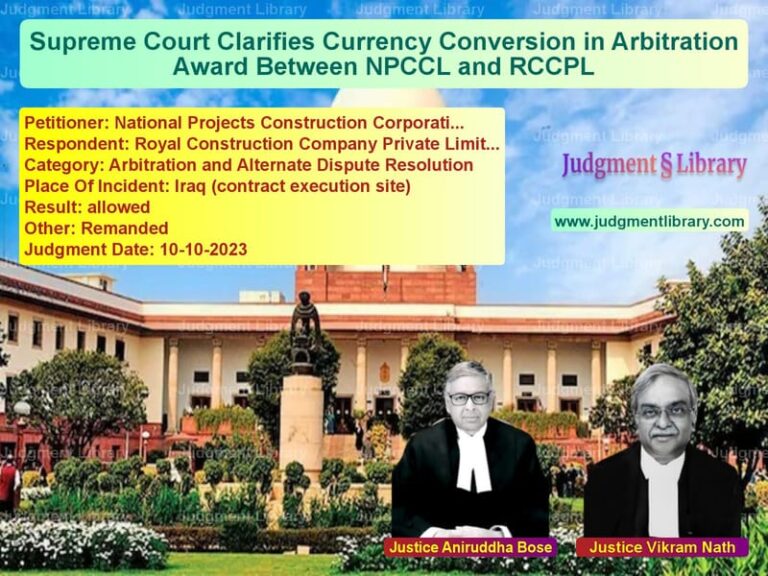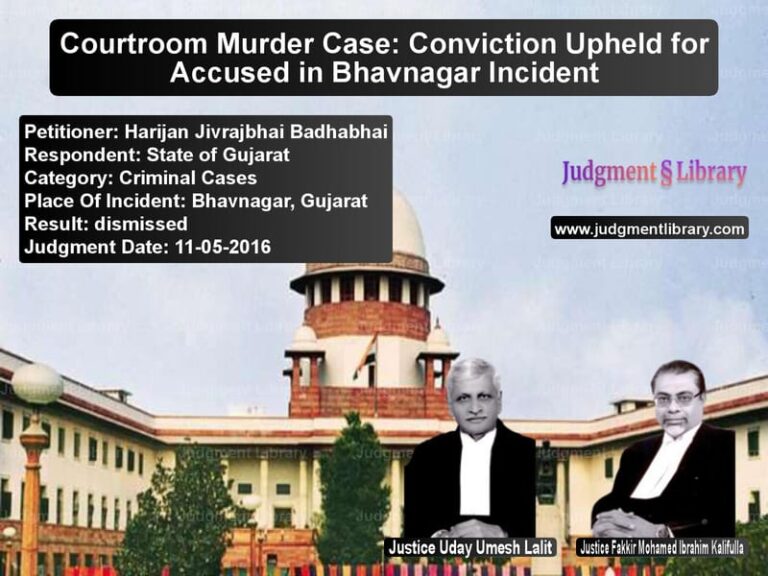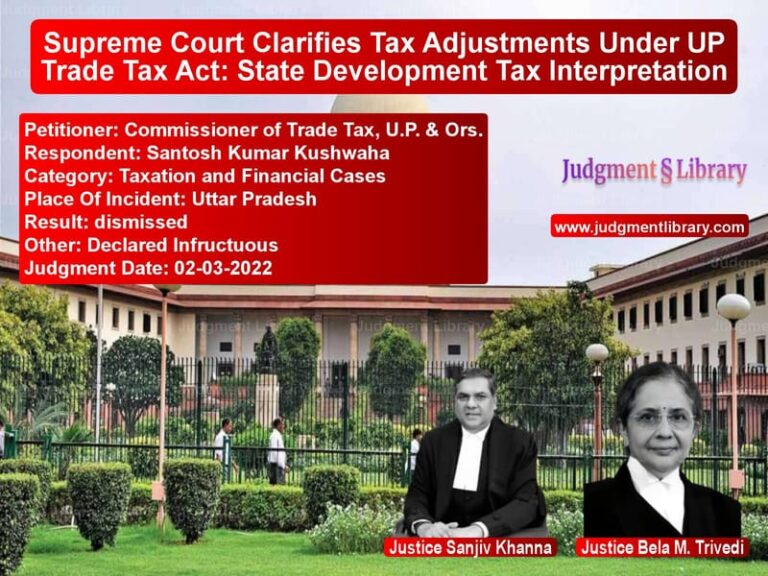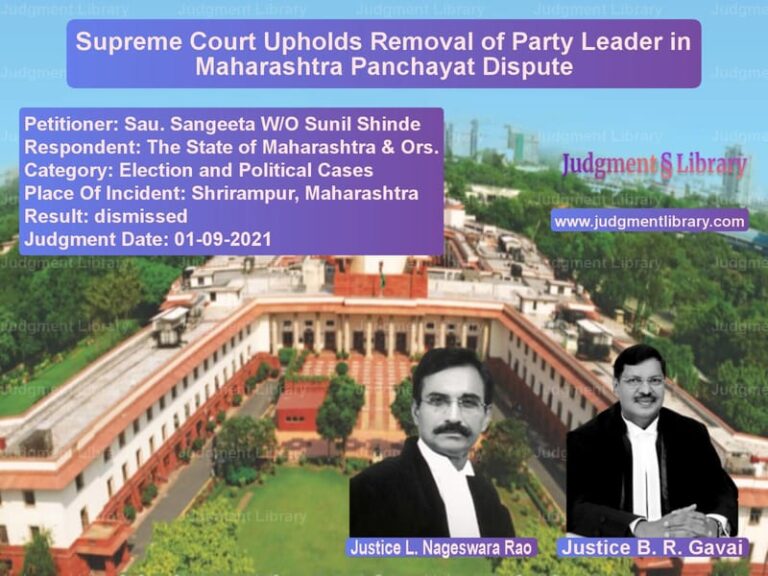Supreme Court Denies Insurance Recovery Rights in Fake License Case: IFFCO Tokio vs. Geeta Devi
The Supreme Court of India recently ruled on a significant case involving an insurance claim dispute in IFFCO Tokio General Insurance Co. Ltd. vs. Geeta Devi & Others. The case centered on whether an insurance company could recover compensation paid to accident victims when the driver had a fake driving license. The Supreme Court upheld the Delhi High Court’s ruling, denying the insurance company’s right to recover the compensation.
Background of the Case
The case arose from a fatal road accident on May 9, 2010, when a Tempo vehicle (HR69D-0246) collided with a motorcycle, causing the death of the motorcyclist, Dharambir. Dharambir’s dependents, including his widow, parents, and children, filed a claim under the Motor Vehicles Act, 1988, seeking compensation.
The Motor Accident Claims Tribunal (MACT) in Rohini, Delhi, awarded a compensation of ₹13,70,000 to the claimants. However, the MACT also ruled that since the driver, Ujay Pal, had a fake driving license, the insurance company was not liable to pay the compensation. Instead, the tribunal directed IFFCO Tokio General Insurance Co. Ltd. to deposit the compensation amount but allowed them to recover it from the vehicle’s owner, Netra Pal Singh (who had since passed away, and his legal heirs were brought into the case).
Appeal to the Delhi High Court
The vehicle owners appealed the MACT ruling before the Delhi High Court. The High Court reversed the MACT’s decision, stating that the insurance company had failed to prove that the vehicle owner had knowingly employed a driver with a fake license. The court ruled that since the insurance company had not pleaded or proved any willful negligence on the owner’s part, they could not deny liability under the policy.
Appeal to the Supreme Court
Aggrieved by the Delhi High Court’s decision, IFFCO Tokio General Insurance Co. Ltd. approached the Supreme Court, arguing that they had a valid right to recover the compensation from the vehicle’s owner.
Arguments by the Petitioner – IFFCO Tokio General Insurance Co. Ltd.
The insurance company presented the following arguments:
- Fake License Disqualifies Coverage: The driver, Ujay Pal, had produced a driving license from Mathura, which was later found to be fake. As per the insurance policy, they were not liable to cover accidents caused by an unlicensed driver.
- Contractual Violation: The insurance company claimed that the use of a driver with a fake license violated the terms of the policy, which required drivers to hold a valid driving license.
- Negligence of Vehicle Owner: The owner had allegedly failed to verify the authenticity of the driver’s license before employing him, leading to a breach of policy conditions.
- MACT’s Right to Recovery Was Justified: The tribunal’s order allowing recovery from the owner was correct and should be reinstated.
Arguments by the Respondents – Geeta Devi & Others
The legal heirs of the deceased vehicle owner countered with the following points:
- No Evidence of Negligence: The insurance company failed to prove that the deceased owner had knowingly employed a driver with a fake license.
- Verification Not Required by Law: There was no statutory requirement that a vehicle owner must verify a driver’s license beyond ensuring that it appears valid.
- Hearsay Evidence: The insurance company relied on statements from the owner’s widow, which were not backed by solid proof.
- High Court’s Decision Was Just: Since the insurance company had not fulfilled its burden of proof, it could not claim recovery from the owner’s legal heirs.
Supreme Court’s Key Observations
The Supreme Court analyzed the relevant provisions of the Motor Vehicles Act, 1988, particularly Section 149(2), which allows insurance companies to defend claims in cases of policy breaches.
1. Burden of Proof on the Insurance Company
The Court ruled that the insurer must prove that the owner was aware of the fake license to deny liability. It stated:
“It is for the insurer to establish that the breach of policy was willful on the part of the insured.”
2. No Legal Obligation to Verify a License
The Court noted that there is no law mandating vehicle owners to verify a driver’s license with the transport authority before employment.
3. No Wilful Breach of Policy
The Court found that the owner had reasonably relied on the driver’s license, which appeared genuine. Since there was no evidence of deliberate negligence, the insurance company could not escape its liability.
4. Liability of Insurer in Fake License Cases
The Court cited previous precedents, including National Insurance Co. Ltd. vs. Swaran Singh, which held that an insurer can avoid liability only if it proves a wilful breach of policy conditions by the insured.
Supreme Court’s Final Ruling
After considering all aspects, the Supreme Court ruled:
- Appeal Dismissed: The insurance company’s plea was rejected.
- No Right of Recovery: The insurer had to bear the liability and could not recover compensation from the vehicle owner’s heirs.
- High Court’s Judgment Upheld: The Delhi High Court’s decision was affirmed, denying recovery rights to the insurance company.
Implications of the Judgment
The Supreme Court’s ruling has far-reaching consequences for insurance companies, vehicle owners, and accident victims:
- Protection for Vehicle Owners: Owners will not be automatically held liable if a driver’s license is later found to be fake.
- Burden of Proof on Insurers: Insurance companies must prove willful negligence before denying claims.
- Increased Accountability for Insurers: The ruling prevents insurers from evading liability using technicalities.
Conclusion
The Supreme Court’s decision in IFFCO Tokio General Insurance Co. Ltd. vs. Geeta Devi & Others is a landmark ruling on the liability of insurance companies in cases involving fake driving licenses. It reaffirms that insurers cannot deny claims unless they prove a deliberate breach of policy terms by vehicle owners. The judgment ensures fairness in motor accident compensation and provides clarity on the obligations of vehicle owners and insurers under the Motor Vehicles Act.
Petitioner Name: IFFCO Tokio General Insurance Co. Ltd..Respondent Name: Geeta Devi and Others.Judgment By: Justice C.T. Ravikumar, Justice Sanjay Kumar.Place Of Incident: Delhi.Judgment Date: 30-10-2023.
Don’t miss out on the full details! Download the complete judgment in PDF format below and gain valuable insights instantly!
Download Judgment: iffco-tokio-general-vs-geeta-devi-and-other-supreme-court-of-india-judgment-dated-30-10-2023.pdf
Directly Download Judgment: Directly download this Judgment
See all petitions in Motor Insurance Settlements
See all petitions in Compensation Disputes
See all petitions in Negligence Claims
See all petitions in Judgment by C.T. Ravikumar
See all petitions in Judgment by Sanjay Kumar
See all petitions in dismissed
See all petitions in supreme court of India judgments October 2023
See all petitions in 2023 judgments
See all posts in Insurance Cases Category
See all allowed petitions in Insurance Cases Category
See all Dismissed petitions in Insurance Cases Category
See all partially allowed petitions in Insurance Cases Category

